
Soft skills: what are they and how to evaluate them in a job interview
IN THIS ARTICLE
- Soft skills: what are they and why are they important?
- Transversal skills to be evaluated
- How to evaluate soft skills during an interview
- What are the most important soft skills for employees?
- How to evaluate transversal skills (if you are a recruiter)
- How In-recruiting can help you in assessing skills
Soft skills are a very important part of candidate evaluation and can be very impactful on the future success of the business. Let’s see why.
Soft skills: what are they and why are they important?
The evaluation of soft skills can often be a decisive step in choosing the best candidate and successfully completing the entire recruitment process. Consider that 89% of mis hires are due to the lack of motivation on the part of the candidate or a mis match in personality, often because the soft skills were not evaluated enough during recruitment (source Leadership IQ and LinkedIn Global Talent Trends 2019).
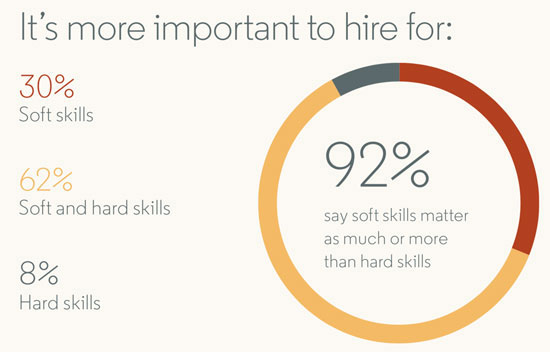
Soft skills and recruiting – LinkedIn Global Talent Trends 2019
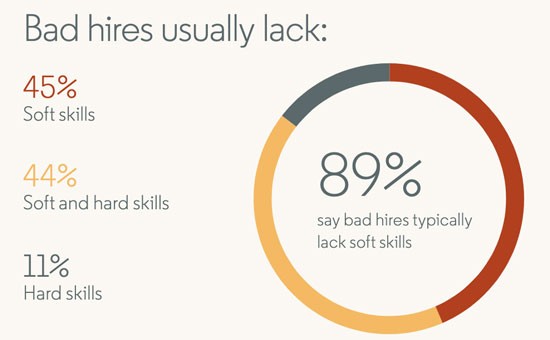
Bad Assumptions – LinkedIn Global Talent Trends 2019
But what exactly is the definition and translation of this term?
These particular skills, also described as transversal skills, represent the personal qualities, or rather, attitudinal characteristics, of a candidate: the character traits, personal attributes, communication skills and personal signals that can facilitate success at work.
There are two main types of soft skills:
– Internal transversal skills: these are the skills through which one perceives and interacts with oneself
– External transversal skills: these are the skills through which one perceives and interacts with others
It is not easy to quantify and identify soft skills: it can be very complicated, for example, to identify them in a group interview, more often they are identified through aptitude or personality tests. The quality of the questions, during a structured selection process is therefore fundamental: the questions must be targeted and effective towards the final goal.
Hard skills (professional, technical skills such as computer skills, university degrees, certificates, references, experience) represent a good starting point in the initial phase of a recruitment process but they are not enough. Transversal skills include: intuition, empathy, ambition, emotional intelligence, tenacity to achieve professional goals, organisational ability, exemplary behaviour in a working environment and the aptitude for team collaboration. These are all crucial transversal skills to start a successful professional career, in all professional environments, even the most technical environments.
In the marketing and communication sector, marketing managers should have a good level of communication and excellent critical skills, while project managers should be able to relate to the entire team. Even in a business sector such as information technology, it is important for a recruiter to be able to evaluate a candidate with the appropriate skills. A good developer, in addition to being able to write perfect code, must also have “extraneous” skills to their technical skills. A successful computer programmer must be able to understand the objectives, prospects and needs of the client, and manage work deadlines.
Transversal skills to be evaluated
Which soft skills do you need to be aware of to evaluate candidates in the recruitment process? It is essential to be able to recognise attitudinal characteristics. From interpersonal skills to time management, from problem solving skills to passion and enthusiasm at work, skills that often make the difference and lead the hire towards a brilliant career and dedicated to professional success.

Examples of the main transversal skills:
– Interpersonal skills: the ability to relate is very important, regardless of the role. Listening, inspiring, interacting, knowing how to communicate with colleagues, bosses, customers and suppliers is a quality that could make the candidate the best brand ambassador of the company.
– Time management: having good time management skills can be a decisive skill for achieving all the work requirements. Every day, each of us has goals to accomplish and results to achieve: getting the most out of the time available is a transversal skill that can make a difference.
– Reliability: soft skills that can be classified under the term reliability could be skills such as honesty, sincerity, integrity, punctuality. Selecting a candidate with these qualities leads to increased trust among all of the employees.
– Analytical skills: candidates with this competence can identify problems, break them down into sub-problems and identify cause-effect relationships. What does this mean? Understanding the nature of problems and their various facets, analysing them, deconstructing them and using logic to solve them in the time available.
– Problem solving: this skill is often listed in job announcements. Linked to the ability to analyse, a good level of problem solving means addressing and overcoming day to day obstacles.
– Team working: knowing how to collaborate with the whole team is a necessary skill for achieving one’s own goals. Corporate team building activities, for example, are useful for improving a company’s team working.
– Communication skills: related to team working and interpersonal skills, one of the skills often evaluated in the recruiting phase is a candidate’s capacity for effective communication. Communicating concepts and presenting one’s ideas in a clear, precise and, above all, effective way is important for the whole company.
– Flexibility: A candidate who has a good level of flexibility is a candidate who works reliably and effectively. Today’s hectic pace of work often requires recruiters to select candidates who are agile and responsive to changes.
– Multitasking: in jargon a multitasking person is someone who manages to carry out multiple activities at the same time. Knowing how to identify a candidate with excellent multitasking skills can be a significant advantage.
– Passion and enthusiasm: these are two related skills which, if possessed by the candidate, mean that they will achieve their objectives easily enough, and also contribute to the general improvement of the company culture.
How to evaluate soft skills during an interview
Once soft skills are defined and understood and it has been decided which soft skills, alongside the hard skills, are essential for new hires, it is important to know how to evaluate them during an interview. Identifying aptitude characteristics is an important step for recruiters but it’s not always easy. Let’s see how to recognise and evaluate some soft skills and the questions to ask to evaluate them.

How to evaluate curiosity.
Questions to ask
– How do you keep up to date with the news in your sector?
– What do you do to increase your professional level?
– What is your preferred learning method?
– What can you tell me about our company?
How to evaluate perseverance
Questions to ask
– What could make you impatient at work?
– How do you react to negative responses?
– For you, what characterises failure?
– What would lead you to abandon a project?
How to evaluate problem solving
Questions to ask
– What innovative processes has you undertaken to solve a sudden problem?
– How would you manage a queue of 500 emails in your mailbox in an hour?
– How many times do the clock hands overlap in a day?
– How did you approach a project where you realise that your usual approach won’t work?

How to evaluate leadership
Questions to ask
– Who are the people with whom you had the best collaboration approach and what characteristics did they possess?
– If you were a superhero, who would you be?
– Describe a project in which you have taken the lead?
– How do you help your colleagues / collaborators to develop their skills?
In general, to manage interview questions that are related to soft skills it is important to ask open questions and propose exercises in a hypothetical situation. Candidates should be given the chance to express themselves and illustrate their answers with examples. The actual goal is to evaluate the entire situation, at 360 degrees, in particular:
- The starting situation
- The task performed
- What actions were taken
- The results obtained *
* STAR method (Situation, Task, Action, Result).
What are the most important soft skills for employees?
The world economic forum has identified the 10 skills that employees consider essential in the year 2020:
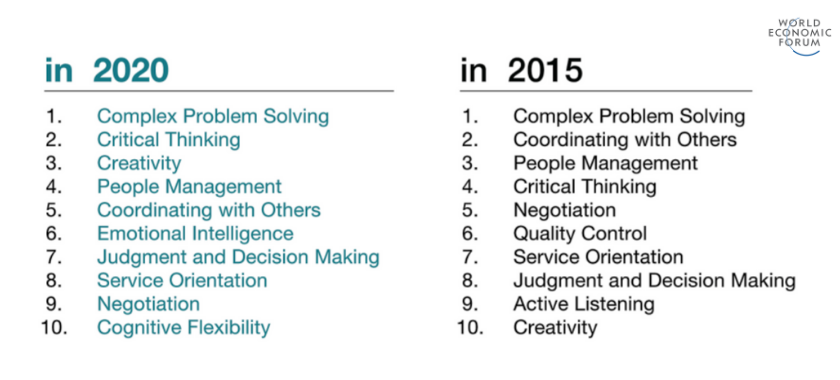
Here’s what they are:
1. Problem solving
2. Critical thinking
3. Creativity
4. Team management
5. Coordination skills
6. Emotional intelligence
7. Decision-making and judgment skills
8. Attention to the customer
9. Negotiation skills
10. Cognitive flexibility
For recruiters it is increasingly important to focus on, and improve the recognition and evaluation of soft skills during the interview phase. From the analysis of behaviour during past work experience, to the ability to evaluate, through specific questions, how candidates could manage more or less complex situations in the workplace. Using a scoring system to measure how satisfactory the answers are and repeating, in rotation, the same questions for all candidates, will make the entire recruitment process easier and more effective.
How to evaluate transversal skills (if you are a recruiter)
During the interview, there are some tips to keep in mind in order to avoid choosing the wrong candidate. Here are some red flags to watch out for while trying to assess a candidate’s soft skills.
• When candidates give predefined answers. Sometimes candidates, when faced with generic and usual questions such as “Describe your role within the team” lead to standard and predefined answers. Therefore, it’s important to also test hypothetical scenarios and situations with questions that take the candidate by surprise, “forcing them” to make spontaneous reflections.
• When the candidate is inconsistent. To evaluate a specific soft skill different approaches can be used. For example, comparing the candidates’ answers during the interview with their emails or their performance in a given activity is a good way to assess the consistency of their skills.
• The candidate does not provide specific examples. A good hire must be able to relate their soft skills with real life experiences. A candidate who doesn’t give specific examples related to their experience is probably not a good hire.
• The candidate has no cultural fit. The best candidate is the one who has a background and a mentality that fits perfectly with the culture, vision and approach of the company. Consequently, the image communicated through the Employer Branding strategy is fundamental.
How In-recruiting can help you in assessing skills
Recruiters who use In-recruiting to centralise the management of their recruitment processes know that they have a valuable ally for effective recruitment management.
This is also true when they have to assess a candidate’s cross-competences during a job interview. How?
There are two advanced features that can help with this goal:
Interview notes
This feature creates a structured evaluation process by setting up personalised evaluation forms for each role or vacancy. All evaluations are centralised and visible to the entire recruitment team. In this way, 2 benefits are achieved: a uniform evaluation (limiting the interview bias), and significant time saving.
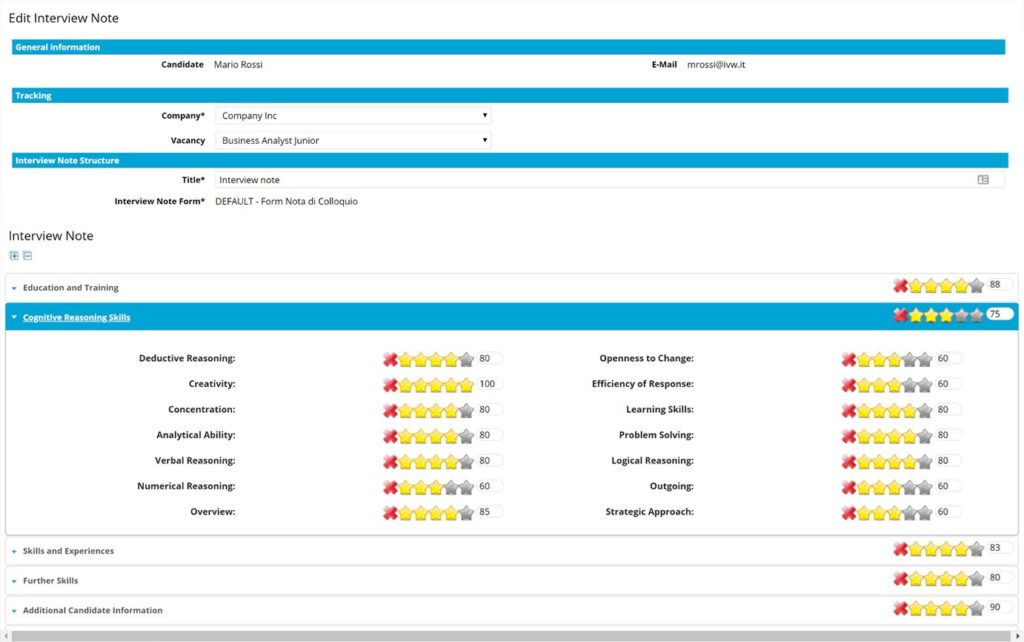
Assigning tags to candidates
An alternative method to using interview notes (which is the recommended method) is the assignment of tags, or labels, to candidates. These tags can then be used to search in the CV database within In-recruiting.
For some positions where soft skills are particularly important (for example for a business development position) it might be useful to filter candidates by an assigned tag related that is crucial for that role.
Video interviews
It is not always necessary or possible to evaluate a candidate’s skills live. For this reason, our recruiting software is integrated with various video interview solutions, both live and scheduled, which allow an assessment of certain skills (e.g. decision making, communication skills, etc.) even remotely.
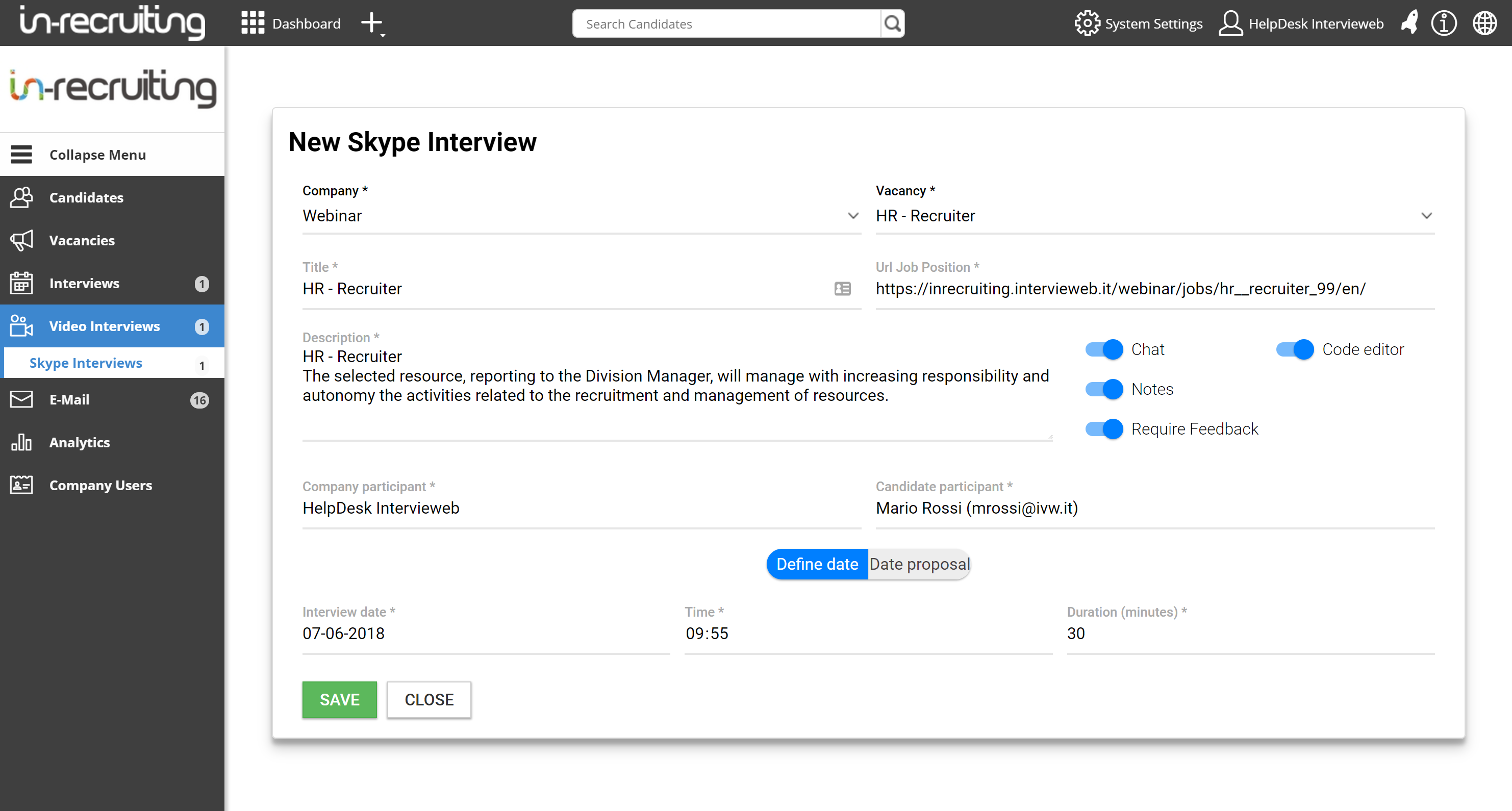
A correct assessment of soft skills can really make a difference in a the search and selection process. It can also improve employee retention. For this reason, it is important to set up a structured evaluation process right from the start, possibly supported by the most effective technological solutions. To discover all the features of In-recruiting, we recommend that you visit this page.
